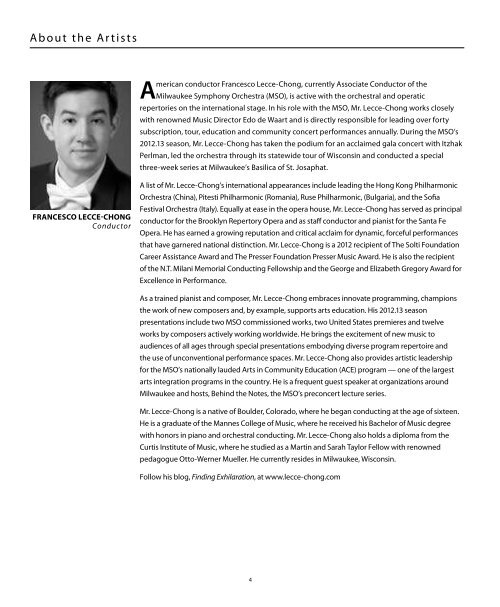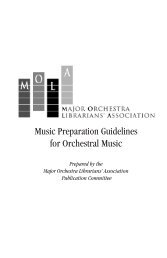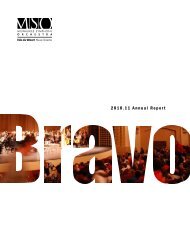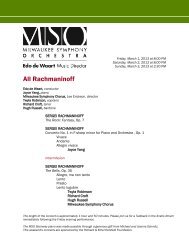contemplation - Milwaukee Symphony Orchestra
contemplation - Milwaukee Symphony Orchestra
contemplation - Milwaukee Symphony Orchestra
You also want an ePaper? Increase the reach of your titles
YUMPU automatically turns print PDFs into web optimized ePapers that Google loves.
About the Artists<br />
Conductor’s Insight by Francesco Lecce-Chong<br />
Francesco Lecce-Chong<br />
Conductor<br />
American conductor Francesco Lecce-Chong, currently Associate Conductor of the<br />
<strong>Milwaukee</strong> <strong>Symphony</strong> <strong>Orchestra</strong> (MSO), is active with the orchestral and operatic<br />
repertories on the international stage. In his role with the MSO, Mr. Lecce-Chong works closely<br />
with renowned Music Director Edo de Waart and is directly responsible for leading over forty<br />
subscription, tour, education and community concert performances annually. During the MSO’s<br />
2012.13 season, Mr. Lecce-Chong has taken the podium for an acclaimed gala concert with Itzhak<br />
Perlman, led the orchestra through its statewide tour of Wisconsin and conducted a special<br />
three-week series at <strong>Milwaukee</strong>’s Basilica of St. Josaphat.<br />
A list of Mr. Lecce-Chong’s international appearances include leading the Hong Kong Philharmonic<br />
<strong>Orchestra</strong> (China), Pitesti Philharmonic (Romania), Ruse Philharmonic, (Bulgaria), and the Sofia<br />
Festival <strong>Orchestra</strong> (Italy). Equally at ease in the opera house, Mr. Lecce-Chong has served as principal<br />
conductor for the Brooklyn Repertory Opera and as staff conductor and pianist for the Santa Fe<br />
Opera. He has earned a growing reputation and critical acclaim for dynamic, forceful performances<br />
that have garnered national distinction. Mr. Lecce-Chong is a 2012 recipient of The Solti Foundation<br />
Career Assistance Award and The Presser Foundation Presser Music Award. He is also the recipient<br />
of the N.T. Milani Memorial Conducting Fellowship and the George and Elizabeth Gregory Award for<br />
Excellence in Performance.<br />
As a trained pianist and composer, Mr. Lecce-Chong embraces innovate programming, champions<br />
the work of new composers and, by example, supports arts education. His 2012.13 season<br />
presentations include two MSO commissioned works, two United States premieres and twelve<br />
works by composers actively working worldwide. He brings the excitement of new music to<br />
audiences of all ages through special presentations embodying diverse program repertoire and<br />
the use of unconventional performance spaces. Mr. Lecce-Chong also provides artistic leadership<br />
for the MSO’s nationally lauded Arts in Community Education (ACE) program — one of the largest<br />
arts integration programs in the country. He is a frequent guest speaker at organizations around<br />
<strong>Milwaukee</strong> and hosts, Behind the Notes, the MSO’s preconcert lecture series.<br />
Mr. Lecce-Chong is a native of Boulder, Colorado, where he began conducting at the age of sixteen.<br />
He is a graduate of the Mannes College of Music, where he received his Bachelor of Music degree<br />
with honors in piano and orchestral conducting. Mr. Lecce-Chong also holds a diploma from the<br />
Curtis Institute of Music, where he studied as a Martin and Sarah Taylor Fellow with renowned<br />
pedagogue Otto-Werner Mueller. He currently resides in <strong>Milwaukee</strong>, Wisconsin.<br />
Follow his blog, Finding Exhilaration, at www.lecce-chong.com<br />
Throughout history,<br />
composers have explored<br />
the philosophical issues of their<br />
day through music. Two famous<br />
examples come from Mozart<br />
and Beethoven. Mozart’s opera,<br />
The Magic Flute is based on<br />
Masonic principals and in<br />
Beethoven’s immortal Ninth<br />
<strong>Symphony</strong>, the “Ode to Joy”<br />
embraces the unifying outlook<br />
of Friedrich Schiller. This<br />
weekend, I am delighted to<br />
share with you three other<br />
important works that ask for our<br />
<strong>contemplation</strong> of their message.<br />
Hadyn: The Seven Last Words of Christ on the Cross<br />
Up until about 1850, most philosophical movements centered on religion and<br />
humankind’s relationship with God. Almost all music written at that time<br />
expressed the same, with the exception of the absolute music of symphonies<br />
and concerti which were based on musical form. Not being one of the latter,<br />
The Seven Last Words of Christ on the Cross is Haydn’s masterful meditation on<br />
the last sayings of Jesus. We are fortunate to have some wonderful insight from<br />
Haydn himself about the inception of the work:<br />
Some fifteen years ago I was requested by a canon of Cádiz to compose<br />
instrumental music on the seven last words of Our Savior on the Cross.<br />
It was customary at the Cathedral of Cádiz to produce an oratorio every year<br />
during Lent, the effect of the<br />
performance being not a little<br />
enhanced by the following<br />
circumstances. The walls,<br />
windows, and pillars of the<br />
church were hung with black<br />
cloth, and only one large lamp<br />
hanging from the center of the<br />
roof broke the solemn darkness.<br />
At midday, the doors were closed<br />
and the ceremony began. After a short service the bishop ascended the pulpit,<br />
pronounced the first of the seven words (or sentences) and delivered a discourse<br />
thereon. This ended, he left the pulpit and fell to his knees before the altar. The<br />
interval was filled by music. The bishop then in like manner pronounced the<br />
second word, then the third, and so on, the orchestra following on the conclusion<br />
of each discourse. My composition was subject to these conditions, and it was<br />
no easy task to compose seven adagios lasting ten minutes each, and to succeed<br />
one another without fatiguing the listeners; indeed, I found it quite impossible to<br />
confine myself to the appointed limits.<br />
FRANZ JOSEPH HAYDN 1732 – 1809<br />
Today, The Seven Last Words of Christ on the Cross is most commonly heard<br />
arranged for string quartet, and during Haydn’s lifetime it was known as an<br />
oratorio with chorus. However, the original version (and the only direct version<br />
4<br />
5








